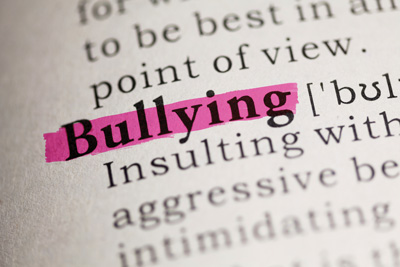Culture of kindness
Permanent link
When I was in junior high, I learned the hard way what it felt like to be bullied. Out of the blue, these three girls who'd been close friends of mine only the day before suddenly started taunting me.
One day, we were BFFs playing Chinese jump rope and choreographing a dance routine to Paula Abdul's "Opposites Attract." The next, they'd declared war on me. They would imitate my mannerisms, whisper to each other as I'd pass in the halls, and campaign to get other girls not to like me.
It was so devastating to my junior high psyche that I didn't want to go to school. But then, a few weeks later, they re-friended me. As quickly as they'd cut me out, they let me back into their inner circle, but their clique was no longer a place I desired to be.
The experience taught me a lot about how random and cruel people can be to each other.
Of course my story isn't that bad -- and it certainly isn't unique. It's even typical. A few years ago, I attended a BBYO-sponsored anti-bullying forum for an auditorium full of Jewish teens and their families. Members of the crowd were asked to rise if they'd ever "witnessed or been involved in bullying"; every person in the room stood up.
Kids today face a much tougher world than I did. Back when I was in school, a cruel joke or rumor had a short shelf life, confined to one's school or neighborhood. But these days, we all have the power to spread gossip, lies, and venom to millions with one click.
You'd think bullying would stop after high school, but that's just not the case. We urge our children to treat each other with kindness, but we expect them to do as we say -- not as we do.
Face it. We live in a culture of mean -- in politics, on reality shows, in the pages of tabloids where women celebrities who look a pound heavier than they did the week before are paraded on covers to be mocked, and in the anonymous comment sections of practically any seemingly innocuous electronic news story.
What does it feel like to face such constant and inescapable public cruelty, humiliation, and ostracism?
The world got a memorable answer -- a lesson in empathy -- at this year's Oscars. Chicago native Graham Moore inspired millions in his poignant acceptance speech for his adapted screenplay of the film The Imitation Game. It tells the story of Alan Turing, the mathematician who broke the Nazi code, which was essential to the eventual Allied victory over Hitler. Instead of being hailed a hero, Turing, who was gay, was investigated and prosecuted for "homosexual acts" and died, likely from suicide, before his 42nd birthday.
Moore said he related to Turing's story of feeling different, and that he tried to take his own life as teenager. "I felt weird and I felt different and I felt like I did not belong," Moore said in his speech. "…I would like for this moment to be for the kid out there who feels like she's weird or she's different or she doesn't fit anywhere. Yes, you do. I promise you do. Stay weird. Stay different. And then when it's your turn and you are standing on this stage, please pass the same message to the next person who comes along."
Like Moore and Turing, people of all stripes -- but particularly women, minorities, people with disabilities, and the LGBTQ community -- are targets of ridicule. Every week, we read a headline about another kid driven to suicide because they were tormented by bullies either in the flesh or on social networks.
We especially, as Jews, should care deeply about bullying. The issue goes to the very heart of our history and Jewish teachings. After all, just as bullies pick their scapegoats for no reason other than their victims are different from them, we as Jews have been bullied and branded as scapegoats on a grander scale throughout our history.
We should care because our tradition is rooted in kindness. The Torah teaches us most fundamental of all: "Love your neighbor as yourself."
And many other Jewish laws forbid cruelty from every angle. Halbanat panim bids us not to inflict public humiliation; rechilut prohibits statements that are untrue, while lashon harah expands this prohibition to include factually truthful speech that might malign an individual. And we are taught the concept of adam yachid -- that every human being is unique and precious.
Indeed, our community is working to counteract bullying. SHALVA, a JUF beneficiary combatting domestic abuse, and Response, a teen outreach program of Jewish Child and Family Services, both engage children, teens, parents, and teachers through anti-bullying programs.
But faced with a culture of mean, it's not enough to urge our children to teach each other with kindness. We have to practice it ourselves.
Let's not forget that kindness must be passed on to our children -- l'dor vador -- from generation to generation.
If everyone reading this could wake up tomorrow and feel the empathy to be a little kinder to each other -- to our families, to our friends, to strangers on the bus, to the people in our Facebook networks, and yes, even to the celebrities we've never met -- maybe, just maybe, we can change our culture for the better.
Because a culture of kindness begins with each one of us.
To learn more about anti-bullying programs offered through Response, visit www.responsecenter.org, email responsecounseling@jcfs.org, or call (847) 676-0078.
Response is a program of Jewish Child & Family Services (JCFS), a partner in serving our community supported by JUF.
To learn about anti-bullying programs offered through SHALVA, contact Bobbie Gordon by visiting www.shalvaonline.org, email bgordon@shalvaonline.org, or call (773) 583-4673.
SHALVA, the oldest, independent Jewish domestic abuse agency in the United States, is a beneficiary of JUF.



.jpg)



